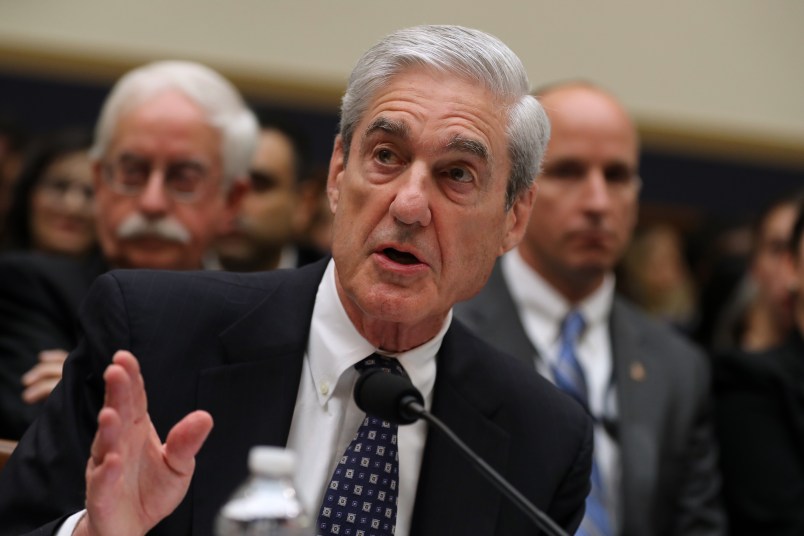An appeals court considering whether the House can access special counsel Robert Mueller’s grand jury material wants to hear arguments on whether the House can even sue to obtain the documents.
Ahead of oral arguments in the case early next month, the appeals court Friday ordered additional briefing addressing whether the House “has Article III standing.”
It’s unclear whether all three judges on the appellate court panel have questions about the House’s standing to sue the Justice Department for the materials. The short, unsigned per curium order of the three-judge panel gave the parties a 3,000-word limit on their briefs.
At a previous hearing in the appeal, Judge Neomi Rao — appointed to the D.C. Circuit by President Trump to fill the seat vacated by Justice Brett Kavanaugh — questioned whether it would be impermissible for the court to get involved since the dispute was ostensibly related to the House impeachment proceedings.
A lawyer for the House had said at the hearing that the grand jury materials could shed light on whether Trump lied to Mueller, an issue the lawyer said that House was looking at in the impeachment inquiry. The impeachment articles passed out of committee Friday morning make only a passing and vague reference to the Mueller probe.
It’s unclear whether Friday’s order from the appeals court was related to the House’s move to advance an impeachment case not related to the materials it is seeking from the Mueller grand jury.
A decision has not been issued yet on the Justice Department request to preliminarily halt disclosure of the materials while the case is fully appealed.
Oral arguments on the merits of the appeal are scheduled for Jan. 3. The House’s lawsuit for the materials was filed in July after the DOJ claimed that grand jury secrecy law prohibited their transmission to the House. In October, Judge Beryl Howell, the chief judge of the D.C. district court, issued a 75-opinion permitting the disclosure of the materials because the House’s impeachment inquiry fell under grand jury secrecy law’s exception for judicial proceedings.







Why does this article not name the judges on the panel or even the lawyers referenced? WTF?
Well, the great experiment in democracy was nice while it lasted.
Is there a Constitutional Cliff Notes we could forward?
So according to Rao, if the House is investigating whether Trump has committed high crimes or misdemeanors and seeks documents from the Executive Branch in conjunction with its investigations the White House can deny access to the documents and the House has no recourse. The House then presents its case based on whatever it can cobble together from third parties, which the GOP counters as hearsay and proclaims that the Democrats have failed to prove their case. The GOP then says, by the way, you cannot even investigate a sitting president much less indict him for his crimes. Ergo, he is president for so long as the electorate is dumb enough to keep him in office. But then, Rao clerked for Clarence Thomas.
the other two, besides Rao, are Judith Rogers and Thomas Griffith – both of whom were on the correct side of the request to hear the Mazar’s case en banc.
my guess is that this is just a shiny object meant to keep Rao distracted while the two real judges write their opinion affirming the lower court decision. Rao can supervise her clerks’ rephrasing of the Team Trump brief for her dissent in the ruling, and everyone will be happy.